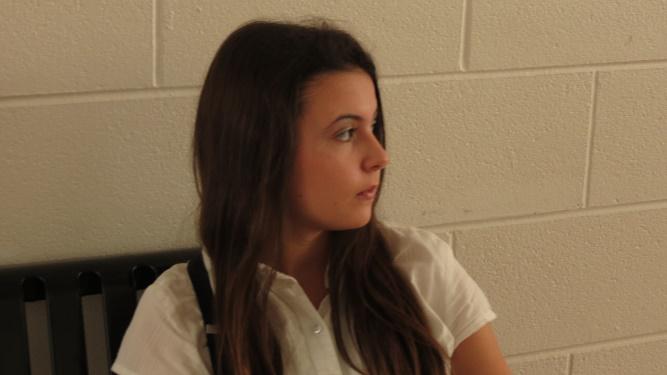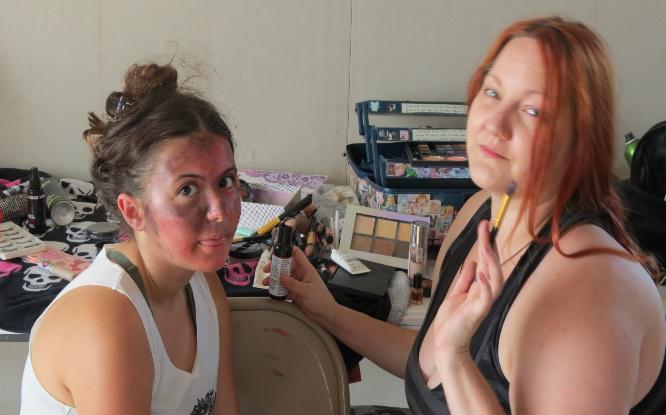ACTING 101 Acting Etiquette
- Written by Paris Hepburn

Many actors assume all you have to do is show up on set and act. This includes kids as well as adults. I am always astonished when people don’t have the slightest clue how to act on set. From the first time I was on set, at the young age of two, I always had set rules that I had to follow in order to get through the performance. Young children can be difficult to control but adults should know better. Once you book a job you will be expected to understand the guidelines of what is accepted of you on set. Common curtsey is always anticipated of everyone who is there whether it be a small group or a large group, children or adults. First off, production needs to be very organized so people know what to expect while they are there.
Getting Ready. Go and work out at the gym if possible because filming takes a lot of strength and stamina and can be long and exhausting. I work out at the gym three days a week for two hours regardless if I am filming or not. This helps me keep in shape for anything. Getting enough sleep is vital to your performance and will keep you prepared for whatever happens. Be presentable when you arrive on the set. You should not wear with logos, bright shirts such as yellow, white, and even light greys can affect the lighting of a scene by adding undesired color shades. So choose wisely.
Your preparation should focus your face, body, and behavior. Open-toed shoes or sandals are not a wise choice unless the role requires them. Hair length, color, or style should remain the same as when you were booked. Make sure you always shower, brush your hair and teeth, and wear clean clothes.
Never be late and it’s wise to be a half hour early. Give yourself time to travel, warm up, and be ready to work at start time. If you are going to leave for breaks, make sure you arrive back on time and ready to work.
Always bring a pencil, paper and a notebook with you. Being able to write things down really helps with the process of remembering what is going on. Write down character thoughts, facts about the project and character, what other characters say about you, the circumstances of every scene, questions, daydreams, and notes from the director.
Rules. I know being on the set can be intimidating and downright boring at times. People get antsy while waiting. Who knows how long you’ll be waiting before it’s you turn to go on. While the anticipation builds, so does the excitement and nervousness. I usually bring a drawing pad to help pass my time. People start talking and socializing and one thing leads to the next until someone calls it to a halt.
While everyone is getting ready, be prepared. Don’t isolate yourself from the other members of the cast members. Make yourself available. Ask question about what they are doing. Talking a lot about yourelf is rude. Don’t go overboard with asking questions but have a polite conversation with everyone. If you are relatively new to being on set, follow what others are doing and ask relevant questions.
Good Manners are essential. Behave politely and respectfully as you would in your regular life on set. Everyone there is has responsibility and is essential for the film's production. Don’t bring your personal life on the set and should never influence your work performance.
No photos on set is a rule on most sets. Film companies are protected by copyrights and taking photos would infringe on those rights if you take photos. Although this is a standard rule, there are some sets the rule is more relaxed. On sets that allow you to take photos, do not disturb people’s right to privacy. Always remember, no flash during takes, no shutter sound, and don’t get in the way.

Don’t Disappear. Never disappear from set without telling someone. Disappearing from any workplace is bad etiquette on any job. Always tell someone close to you when you’re going on a break or going to the bathroom in order to avoid difficulties. Waiting a long time on set is typical in filming. Long waits are unavoidable. Find something to keep you busy without interfering with the scenes that are already going on. Never ever complain about something taking too long. Be patient and entertain yourself.
Walk On Set. Never run on a set under any circumstances. If something needs to be done quickly walk quietly to what needs to be done or where you need to be. The reason there is no running or talking is because scenes require a great deal of focus. If you have someone running, it disrupts the concentration of the performance or performers. Some scenes may require speedy changes which enforces focus without any interference.
Quite on the Set. Even before the cameras start rolling there should be no shouting or talking loudly. When cameras start to role a call ‘Quiet on the Set’ is announced. That is a clue that everyone needs to be quite and absolutely no talking. People are working. Being at the right time and doing the best job possible is essential to getting along with everyone. This includes observing what’s going on around you. Someone who remains quiet and unseen when needed is vital to set involvement. ‘Quiet on the Set’ also means to turn cell phones off or on vibrate and don’t ask non-related questions.
If the Director calls for silence during filming, don’t even whisper. The sound equipment is very sensitive and noises can be heard easily. Use hand signals when trying to get attention or ask a question. If you happen to make a mistake, don’t draw attention to it. Mistakes happen all the time on set. If someone does shout “CUT” because of something you did, just apologize and let them know you won’t do it again.
Don’t Move Anything. All equipment and objects on the set are there for a purpose. If you don’t know where some prop or item belongs, don’t touch it. People on the crew side need to know where everything is for easy access. If you move something, then that means that someone will have to take time to hunt it down. The chances are that you’ll move set props and create problems that can impair the film’s reputation. Stay in your department or group you work with and work only with items you know how to handle. If something seems to be in your way, it doesn’t mean it is.
Pay attention. Paying attention to everything that happens around you is imperative to being on the set. If you aren’t paying attention you could miss something vital that you were supposed to do which could reflect badly on you and the whole production.
Be understanding. Being understanding can save you a lot of hassles and misunderstandings on the set. A polite “I understand” is a universal answer on set. Whatever you’re asked about or told to do, “I understand” is the best answer. Also beneficial is to repeat the question in your answer because this clarifies to the person who asked you that you got the point.
Studio rules. Getting to know the rules of your particular film set is important. Each studio is different. Some studios don’t start working until the lead actor gets on set or a director goes around the set for a quick check. So don’t assume that everything is the same for each studio.

Continuity. Everything in a scene has to have continuity. Props may be used several times from a number of angles and abrupt changes will set the scene off. So keep all props and scenes exactly the same as they were until the scene if totally finished.
This also applies to hair, clothing, make-up, body positioning or actions you are asked to do. Leave any objects you are holding the way they were. Any changes could limit how the film can be cut together in the edit room and limit the shots that can be used.
Always remember no matter how much you are involved in the film process, love what you are doing, however strict the rules may be always remember that your life is much more precious than any job and any film made in the world’s history.
When the production is over, you should thank the director, producer, and casting director for the opportunity to be in their film. Always remember that every day you are doing what you love to do and that this is what you want to do more than anything in the world, then you’re lucky to be doing it. This is where you come to be safe, inspired, take risks, collaborate, and create art. Love what you are doing and doing what you love.

https://www.facebook.com/ParisHepburn1/

